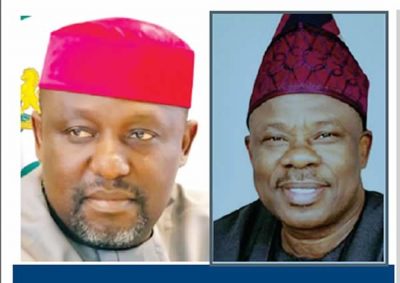Of angry governors and weaponisation of dissent

Except in Utopia, the chairmanship of a national party in any democracy on earth, let alone that of a governing party, is certainly not a picnic. The unfolding scenario in the ruling All Progressives Congress sharply dramatises this as losers in her recent primary elections appear to be shifting into overdrive to diminish the party’s supremacy over an out-gunned opposition that is carefully watching from the wings.
Some angry governors who have lost out in the battle to impose their anointed successors as governorship candidates on the party have thrown caution to the winds, engaging in a macabre dance in direct affront to the leadership of the party, which approximates presidential authority. This is because essential validation continues to flow from President Muhammadu Buhari, the leader of the APC, in tacit approbation of the party’s handling of the primary elections.
However, regardless of the several interventions by Buhari, the embittered governors have refused to be pacified. They have continued to treat the party’s rule-governed processes, discipline and supremacy with disdain. To be clear, some of the APC “rebels without rational and genuine causes” who have been heating up the system include Governor Ibikunle Amosun of Ogun; Governor Rochas Okorocha of Imo; and that of Zamfara, Abdul-Aziz Yari. They are angry with Adams Oshiomhole over the outcomes of the governorship primary elections in their respective states.
It is possible some more governors may be unhappy either with the conduct of the primary elections in their states or the refusal by Oshiomhole to acquiesce in the moves by their colleague-governors in other states to foist their cronies as governorship candidates through some compromised processes. The failure of Okorocha’s “incestuous efforts” to install his son-in-law, Uche Nwosu, as successor, has clearly turned him into a dissenter, whose dissidence has been weaponised, to harass, harangue and pummel the party and its leadership.
In fact, as both the governor and leader of the APC in Imo State, this ringing failure to have his way has pushed Okorocha into initiating open warfare with both the APC and Oshiomhole.
Understandably, Senator Hope Uzodinma’s emergence as the governorship torchbearer in the state has clearly dashed Okorocha’s plot of engendering a political dynasty in a milieu that has grown to rue both his persona and administration.
The emerging consensus among informed observers is that the behind-the-scene shenanigans to embarrass Oshiomhole flow from desperate plots by the Imo governor, acting in cahoots with his co-travellers in Ogun and Zamfara states, to reopen a closed book. The party’s new national publicity secretary, Lanre Issa-Onilu, succinctly captured the situation when he said the grievances and outbursts of some of its leaders, including some of its governors, who lost out at the recent primaries, were a result of their inability to accept their “losses”.
The losers have constituted themselves into an orchestra of seeming transient opposition to Oshiomhole. In fact, much of the forgoing scenario largely defines the shape, form and content of the so-called opposition that allegedly wants to unseat the national chairman in the context of the ramifications of their failed bids to put their cronies in the line of governorship succession. But Oshiomhole is believed to enjoy the solid backing of President Buhari in the task of deepening internal democracy and strengthening the party.
Significantly, all these “rebel” scenarios are undergirded by a common denominator that leans largely on personal interest with pretty little or no connection to party interest and, ultimately, national interest.
This elemental personal agenda unfortunately forms the conceptual basis of politicking in Nigeria. This is the narrative that Oshiomhole wants to deploy the instrumentality of his leadership to re-write: the moderating influence of members must be capacitated in deciding who the party’s standard bearers would be, and not anymore the prerogative or unilateral decisions of incumbent executive heads in the states.

